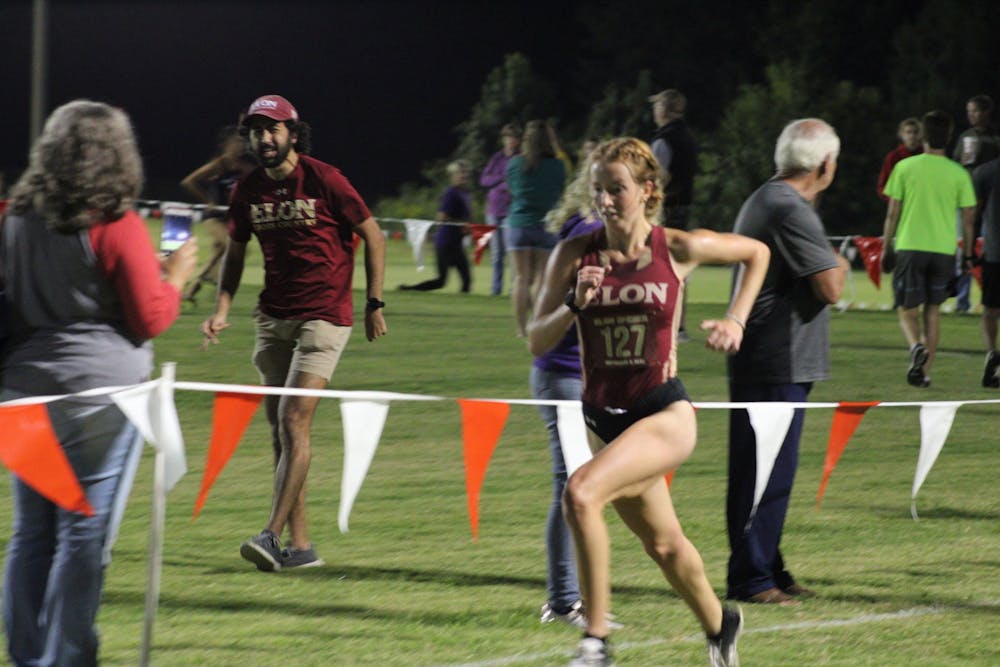Junior Hannah Miller spends her days running around going to practice and being a captain and leader for her teammates. This lifestyle of being a member of Elon’s cross country and track and field team was not a major influence on her commitment to Elon University. But the Honors Fellows program was.
“Athletics was not the most important factor of college,” Miller said. “I wouldn't have been able to come to Elon without the additional funds from the honors scholarship, so I had to make sure I got honors before I could commit for athletics.”
But Miller is not the only honors student balancing a varsity sport. This year, nine students out of 166 in the program are on varsity sports teams. The program is open to everyone who applies to Elon, including student-athletes. The Honors Fellows program is a $13,500 a year scholarship that offers its fellows unique experiences by taking hard courses, completing a research thesis, global study opportunities, and being in a cohort of like-minded students and faculty who are invested in their academics.
Miller said she didn’t commit to Elon until April of high school senior year, which was later than she expected.
According to Honors Program director Lynn Huber, the program aims to accept around 45 students each year.
“If two or three of those are our athletes, that's a good percentage,” Huber said.
Huber also works closely with the application process for each fellow, and being an athlete does not affect a person’s ability to get into the program.
“We're looking for students who are just eager to learn and experience and try new things,” Huber said. “A lot of times, that leads us to people who are like student-athletes or involved in theater, or artistic or involved in Model UN. These things really make candidates stick out because they're trying new things, as well as being really academically engaged and successful.”
Miller says that she applied to be an Honors Fellow before she committed to play varsity sports for Elon.
“I was not entirely sure I wanted to do [Division I] athletics in college, I just happened to be applying to all [Division I] schools,” Miller said. “So I went ahead and did the recruiting process.”
Each honors fellow must complete a research thesis by the end of their senior year on a topic they choose related to their major. Students involved in the program are not required to begin working on research until their junior year; however, the program now requires courses and colloquial events the fellows must attend freshman and sophomore year. After sophomore year, fellows must have their research project approved. Senior year is then used to conduct research.
Junior pole vaulter Madison George found a way to help women in the sports industry through her research project, which focuses on an issue she is passionate about: sports-specific shoes not having readily accessible women’s sizes. She said that she was frustrated that the only available shoes for her sport were not easily accessible to her.
“I had never had pole vault spikes before; I’d just use sprint spikes, and the only pair that I could find in my size was in the UK,” George said. “And then I started thinking, why are pole vault spikes not even made women sizes, because they're all unisex. … Most sports specific shoes don't come in women's sizes, like soccer cleats don't even come in women's sizes in the major brands.”
She says balancing both can be a lot, but she sees it as an opportunity to do the things she is passionate about.
“When I'm at practice, I'm lucky to be at practice. When I'm pursuing my thesis, I'm lucky to have a thesis. So it's not me having this huge workload, it's not me having to do all this stuff. It's like, this is what I want to be doing,” George said. “I'm very connected to my thesis project. And so it's not just a class, it's my own. It's my own hobby. Yeah, it takes up a lot of time. But anything is accomplishable if you're able to sit down and focus on it.”
Huber said that student-athletes who are also honors fellows tend to have a high ability to manage their time and balance everything.
“Being a student-athlete and an honors fellow also suggests somebody has an ability they have some sort of balance … there is this real balance,” Huber said.
For Miller, balancing her sport and honors responsibilities can be taxing at times, but she said time management is her key to juggling both.
“It's just about making sure you plan out your time,” Miller said. “I think athletics honestly helps with that, because I have a very tight schedule and routine in my life, and I'm someone who likes that.”


